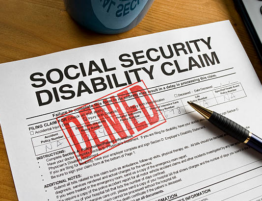
Many disabled Americans rely on Social Security Disability (SSD) benefits when they’re unable to work. These benefits allow disabled individuals to manage their medical condition(s) and maintain their quality of life.
When faced with potential Social Security Disability cessation, beneficiaries can lose access to crucial financial support. At the Patrick J. Kelly Law Office, we understand the importance of disability benefits. Whether someone depends on Social Security Disability Insurance (SSDI) or Supplemental Security Income (SSI), losing either can significantly impact their life.
If you’re asking, “Why did Social Security suspend my benefits?” we’re here to shed light on the matter. Continue reading to learn about some common reasons for disability benefits suspension.
Understanding Social Security Disability Claim Determination
After filing for SSDI or SSI benefits, the claim undergoes a review by Disability Determination Services (DDS). These State agencies are part of the Social Security Administration (SSA) and funded by the federal government.
The DDS review determines whether a claimant is eligible for benefits based on their medical condition. This assessment allows the SSA to learn whether or not a claimant can engage in Substantial Gainful Activity (SGA).
What are Continuing Disability Reviews (CDRs)?
Once granted, disability benefit payments will continue unless there is a change in the claimant’s condition that affects their ability to work. The SSA conducts Continuing Disability Reviews (CDR) periodically to reassess eligibility.
The following criteria determines CDR frequency:
- Medical improvement expected (MIE)
When an impairment is expected to improve, CDRs will be carried out at intervals ranging from 6-18 months following the latest disability determination.
- Medical improvement not expected (MINE)
When an impairment isn’t expected to improve, a CDR will be conducted every 5-7 years.
- Medical improvement possible (MIP)
MIP is when any improvement is possible, but cannot be accurately predicted within a given time period. In these cases, the SSA will conduct a CDR at least once every 3 years.
Reasons They Can Take Away My Social Security Disability
Disability benefits will typically be suspended when a beneficiary returns to work. However, there are many reasons why the SSA could terminate benefits. Below are a few common examples:
- Returning to Work
Earning more than a specified monthly amount could trigger benefit suspension. However, the SSA offers a trial work period (TWP) for SSDI beneficiaries. A TWP allows them to work for up to 9 months in a rolling 5 year period without affecting benefit payments.
- Medical Improvement
If a person’s condition improves and they are deemed capable of working, the SSA may suspend disability benefits. A CDR determines their work capability level.
- Reaching Retirement
When a beneficiary reaches full retirement age, their SSDI benefits automatically transition to retirement benefits. In this case, disability benefits shift and are not truly suspended. SSI benefits may be paid in conjunction with retirement benefits.
- Incarceration
If a beneficiary goes to jail or prison for more than 30 consecutive days, benefits are suspended for the duration of their sentence. SSI benefits are fully terminated if a beneficiary is incarcerated for 12 consecutive months or longer.
- Fraudulent Activity
Engaging in fraud can lead to immediate suspension of benefits. Examples include providing false information or failing to report income to the SSA.
- Changes in Assets or Living Situation
Increases in income or assets, or changes in a person’s living situation, can affect benefit eligibility.
- Failure to Cooperate
Not responding to requests from the SSA or failing to comply with medical treatment plans can jeopardize benefit eligibility.
What Happens When SSDI Is Suspended or SSI Is Suspended?
When faced with SSI or SSDI suspension, it’s crucial to understand your rights and the steps you can take. The Patrick J. Kelly Law Office has extensive experience working in Social Security Disability law. Our legal team can help Alameda residents address the threat of benefit suspension.
If a client has returned to work, seen medical improvement in their condition, or other factors are impacting their benefits, we can help.
Protecting Your Rights
The Patrick J. Kelly Law Office is committed to supporting individuals in securing and maintaining their disability benefits.
Our experience in disability cessation cases ensures that you receive comprehensive support when working with our team. We help clients understand why they’ve lost or may lose their benefits, as well as help file claim appeals.
Professional legal advice can be a critical step in safeguarding your financial stability. The Patrick J. Kelly Law Office is dedicated to helping disabled individuals obtain and preserve their benefits. Contact us today to schedule a free consultation with our Social Security Disability lawyer.





